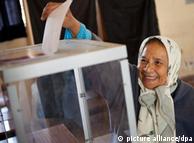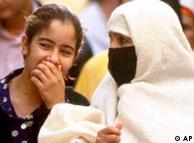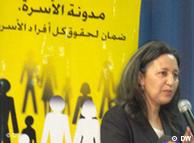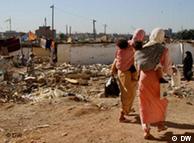DEUTSCHE WELLE
SOCIETY
The PJD won elections and opposed gender policy reforms
 After the Islamist party PJD won elections in Morocco, the future of reforms to the country’s family laws remains up in the air. Activists fear a conservative approach to equal rights could slow – or reverse – progress.
After the Islamist party PJD won elections in Morocco, the future of reforms to the country’s family laws remains up in the air. Activists fear a conservative approach to equal rights could slow – or reverse – progress.
The moderate Islamist Justice and Development Party (PJD) won the most seats in the new Moroccan parliament, which was elected on November 25. The party is also the parliamentary group with the highest number of women in parliament with 18 PJD members among the 67 female members of parliament.
Bassima Haqqaoui, head of the PJD women’s organization demands a stronger public presence of women, more rights for female workers and peasant women as well as more family support. But the PDJ has been silent on the difficult implementation of reforms made in 2004 to family law, which is proving to a crucial issue regarding gender policy in Morocco.
The 2004 reform of “Mudawwana” – or the law governing marriage, divorce, parentage, inheritance, child custody and guardianship – got rid of the most striking injustices: Men and women can now both file for divorce. Women no longer bear a duty to obey their husband and men are no longer considered the family’s leader.
The PJD had long fought against the reforms to family law, which was based on a conservative interpretation of Sharia law that permitted husbands to disown their wives at will while forbidding women from freeing themselves from an unhappy marriage; wives also had to obey their husbands in any circumstance.
 Moroccan family law was based on a conservative interpretation of Islamic law
Moroccan family law was based on a conservative interpretation of Islamic law
Gender expert Atifa Timdjerdine of the Democratic Association of Moroccan Women (ADFM) fears that with the Islamists establishing the government, the already difficult implementation of law reforms will come to a halt.
“Women are allowed to get a divorce now, but many men don’t pay alimony after a divorce,” Timdjerdine said. “There has been a project that assured the government would pay upfront in those cases. Now no one knows if this project will be continued.”
Despite of many delays, progress had been made in implementing the family law reform in recent years. New family courts had been installed and the judicial personnel were trained. But many judges have not accepted the new laws, and many Moroccan women lack the education or simply the money to fight for their rights in court.
Violence and social exclusion
The need for reforms is, however, not limited to family law. Moroccan feminists have called for changes to criminal laws, including a statute that lets a rapist avoid punishment if he marries his victim.
 Women’s rights activist Atifa Timjerdine fears reforms will now come to a halt
Women’s rights activist Atifa Timjerdine fears reforms will now come to a halt
“It cannot be the case that a woman who had been raped is being pressured to marry her rapist so that he can avoid punishment,” said Timdjerdine.
According to independent medical doctors and women’s rights activists, abortion law is also in need of reform. Pregnancies can only be legally terminated if there is a substantial risk of the mother’s life. Doctors who perform abortions, including in cases of rape, can face years in jail.
The situation for unmarried mothers and their children is also grim, activists agreed. According to a study by the INSAF aid organization, half a million children were born out of wedlock in between 2003 and 2009 and estimates put the total number of children born out of wedlock in Morocco at about 1 million.
Since extramartial sex is forbidden in Morocco, these children are regarded as “children of sin.” A law from 1983 enables Moroccan courts to bar the biological father from recognizing his child – even when the father wants to acknowledge paternity.
The organization Solidarite Féminine, which provides a contact point for single mothers and their children in Casablanca, said the situation is unfair to children.
 Many women are too poor to fight for their rights
Many women are too poor to fight for their rights
Organization founder Aicha Chenna recalled the case of a young high school graduate who wanted to work for the police while he was studying law. After passing the qualifying examination, an application required him to fill in the name of his grandfather.
“He said, ‘I don’t know the name of my grandfather, because my mother is not married,'” Chenna said. “At this point, his application was pointless.”
Missed opportunities
Chenna said she is skeptical that necessary reforms to family policies will be undertaken in the near future. And it’s not just because the governing coalition is made up of Islamists and Nationalists and follows a conservative-Islamic agenda.
For her, the problem goes beyond that. She said it’s crucial that Morocco separates religion and state. Efforts to do so were made in summer of 2011 but ultimately failed.
“Demagogues claim that those who demand the separation of religion and state want to destroy religion,” she said. “It eludes me how educated people can believe such an absurdity. Separating state und religion only means that everyone can live his or her religion as they please.”
Author: Martina Sabra /sst
Editor: Sean Sinico
13113


